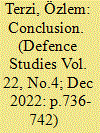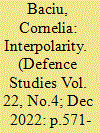| Srl | Item |
| 1 |
ID:
187309


|
|
|
|
|
| Summary/Abstract |
This concluding piece to the Special Issue on Interpolarity: Revisiting Security and the Global Order focuses on the concept of interpolarity as both a conceptual tool to understanding multipolar interdependencies and as an approach aiming to change the nature of multipolarity from one of rivalry and contestation toward one of cooperation in the face of global challenges. It engages with the question: To what extent is overcoming the tension between these poles a dilemma between interpolarity being a desirable goal and being a normative compromise on the values these poles want to uphold in the international arena? After presenting both sides of the dilemma, this piece concludes that an “interpolar” approach to conceptualizing International Relations (IR) can facilitate a more inclusive and comprehensive approach toward a truly global study of IR.
|
|
|
|
|
|
|
|
|
|
|
|
|
|
|
|
| 2 |
ID:
187301


|
|
|
|
|
| Summary/Abstract |
This Introduction to Special Issue (SI) seeks to provide a corrective dimension to unipolar and multipolar understandings of global order by proposing to integrate several levels of analysis. It seeks to introduce a different understanding of the contemporary world order. To this end, it first develops a new theoretical model of world order, putting forward the concept of interpolarity. Interpolarity is understood as the interaction between multiple interdependent poles of different sizes. The main utility of this concept is that it can provide a theoretical foundation for integrating means, ways, and ends in a more stable manner. Second, this Introduction to SI estimates three main conceptual building blocks of an interpolar world order: positive power, citizen reciprocity, and elite bridging. The contributions in this Special Issue examine different aspects of the European security and foreign policy as part of the liberal international order – including the relations with NATO and the US –, EU actorness in cybersecurity governance, French-German cooperation, role conceptions and differentiated integration, as well as the BRICS perspective on world order.
|
|
|
|
|
|
|
|
|
|
|
|
|
|
|
|
| 3 |
ID:
187307


|
|
|
|
|
| Summary/Abstract |
This research seeks to unpack the development of the EU as a security actor in cyberspace. Drawing on the theoretical approach of role theory, this article shows that the EU’s role in cyberspace should be understood in relationality to the other poles. On the one hand, the declining hegemonic role of the US in cyberspace as well as the divergence between the US and the EU with regard to cybersecurity governance has made the EU more aware of the need for cyber sovereignty and strategic autonomy. Therefore, the EU seeks to pursue a role of an autonomous cybersecurity player through the enactment of cybersecurity at institutional and operational level. On the other hand, under conditions of increasing interdependence, the EU has considered international cooperation to address challenges in cyberspace as a strategic priority, therefore seeking to act as a promoter of a multi-stakeholder model. Moreover, interpolariy in cyberspace determines the contestation of EU role by other poles. While the EU has recorded some small successes as a regulation-setter, emerging poles of power in the cybersecurity domain contest the EU’s desired role, promoting more state-centric approaches and seeking to transfer regulatory authority in the cybersecurity domain to the UN.
|
|
|
|
|
|
|
|
|
|
|
|
|
|
|
|